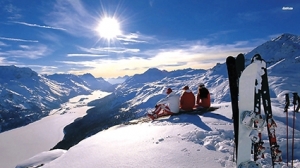Russia Banned from 2018 Winter Olympics
Russia have been banned from competing in the 2018 Winter Olympics, following a decision earlier this week by the International Olympic Committee. “Clean” athletes will still be allowed to compete individually, though.
The IOC also banned the country’s deputy Prime Minister, Vitaly Mutko, for life, from any future involvement with the Olympic games. He is currently helping to orchestrate the football World Cup to be hosted in Russia in 2018.
This is an historic decision, making Russia the first country to be banned from competing in an Olympic tournament for doping.
Over the last few years, the country has faced multiple accusations that officials helped athletes to take performance-enhancing drugs, while government officials allegedly assisted in covering up failed tests.
Over a year after refusing to throw Russia out of the Rio 2016 games, following the publication of a World Anti-Doping Agency-commissioned report that found Russia guilty of a cover-up, which included an FSB-assisted sample-swapping scheme, the IOC has finally taken action against what is said to have been cheating by the nation at the London 2012 and Sochi 2014 Olympic games.
The IOC also corroborated the findings of another investigation led by Richard McLaren, a Canadian law professor, unearthing the many years of where this had been taking place. The incredible findings even suggested that the Russian secret service worked to swap dirty urine samples of athletes with clean ones.
Many Russians have voiced their opinions that the ban stretches beyond mere allegations of doping. They say that this ban is an attempt to keep the winter sport powerhouse down, declaring that the ban is “war” and “racism.”
“They are so scared of us,” tweeted Irina Rodnina, the former Olympic skating champion who is now a pro-Kremlin MP.
Vladimir Zhirinovsky, leader of a pro-Kremlin ultra-nationalist party, called the decision “political and sporting racism”.
Konstantin Kosachev, chair of the foreign affairs committee of Russia’s parliament, said the decision was “part of the general Western policy of holding Russia back.”
“They are always trying to put us down in everything – our way of life, our culture, our history and now our sport,” wrote Maria Zakharova, spokeswoman for the Russian foreign ministry, in a Facebook post.
The ban left athletes the option to compete neutrally, under the Olympic flag, meaning that their “uniform, flag and anthem” will not be used. The decision that many sporting officials and politicians are now burdened with is whether to avoid the Winter Games completely, or to allow individual athletes to make the decision themselves.
Vladimir Putin has, of yet, refrained from comment, but he has previously stated that this decision would be “humiliating.”
Aleksei Durnovo, a Russian commentator said “some people think it’s humiliating to participate like this, others think that we should allow the athletes an opportunity to compete.”
Athletes themselves expressed mixed opinions. Ice hockey star Ilya Kovalchuk said that Russians need to compete. “Refusing means surrender! All clean athletes should go. It’ll be the last games for many, and they won’t have a chance to go to the Olympics again.”
Figure skater Evgenia Medvedeva said she would not participate under a neutral flag. “I’m proud of my country, it’s a huge honor for me to represent [Russia] at the Games. It gives me strength and inspires me when I perform.”
Tom Day












